|
Meet some
of the historic characters from the city of Des Moines, WA
History
Made Life-Size is a public art project conceived and produced
by Dan Wend, as part of the City of Des Moines' 50th Birthday
Celebration. The project was made possible by a grant from 4Culture,
a King County public arts funding organization.
With the help
of the Des Moines History Museum, eleven citizen pioneers from
the formative years of the community were researched, and chosen
to be included in this public art project. Their photographs
were scanned, digitally colorized and enhanced, printed full-size
onto vinyl, applied to a PVC panel, attached to plywood, sealed
and mounted onto cinder blocks for display around Des Moines.
They have attended
several celebration events, including an Open House Birthday
event, The Waterland Parade, Fourth of July Fireworks, and a
Concert in the Park series.
Photo
Projects
Light
and Motion
History
Made Life-Size
Archives
/ Stock Photography
Vintage
Automotive
Mountains
& Wilderness
Maritime
Rural
America
Urban/Industrial
Dunes
& Shorelines
Architectural
Elements
Historical
Images
Coulees
Abstracts
Landscapes
Canyons
/ Deserts
Foliage
/ Flowers
Photo
/ Art
Interior
Design Elements
imagescreens.com
Photo Prints
- Matted
or Framed Prints
Greeting
Cards
- Greeting
Card Sets
Contract
Photo Projects
- Special
Projects
Free Calendar
Background
- January
2010
|
DES MOINES HISTORY MADE LIFE
SIZE
The history of Des Moines,
Washington is woven from the hard work, passion and ingenuity
of those who made up its rich past. Through this project, the
present-day residents of Des Moines have gotten to know characters
from the past who walked the boardwalks, taught math to their
great-grandmothers, and drove the Des Moines Motor Stage all
the way to Seattle and back!
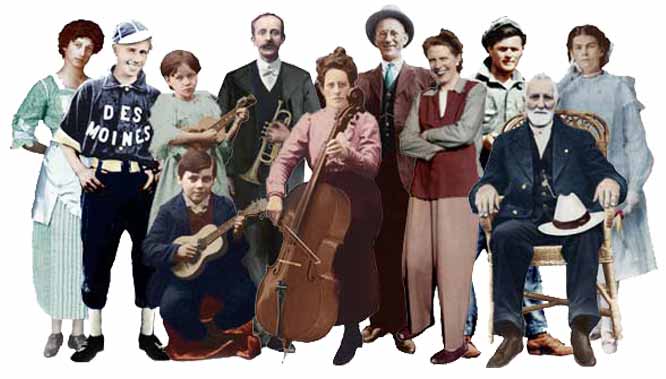 Meet a few upstanding
citizens who helped make Des Moines what it is today.
Meet a few upstanding
citizens who helped make Des Moines what it is today.
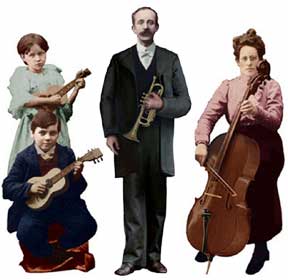 |
In 1907, "Daddy"
and "Mother" Draper founded the Des Moines Children's
Home and Industrial Training School which they devoted themselves
to for twenty years. They adopted hundreds of abandoned, orphaned
and homeless children, taught them trades and how to play musical
instruments and sing. The "Jolly Entertainers" performed
in a small "opera house" theater converted from a barn
and once toured 38 states and parts of Canada. They all played
a part in helping make Des Moines Children's Home one of the
only self-supporting children's homes in history.
|
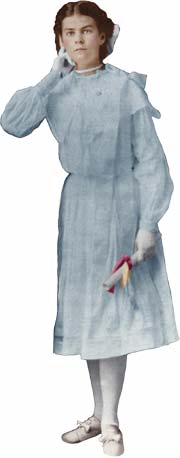 |
|
"Jobby" Neal was
one of the Neal brothers from Nova Scotia. They were some of
the most enterprising of Des Moines' early citizens and ran the
Des Moines to Seattle Motor-Stage Company in 1914 - a time when
northwest roads were primitive at best. They also operated Neal's
Pavillion for 17 years, a dance hall located at what is now Des
Moines Beach Park.
Jobby's brother Melward was
the first local resident to serve in the Washington State Legislature.
|
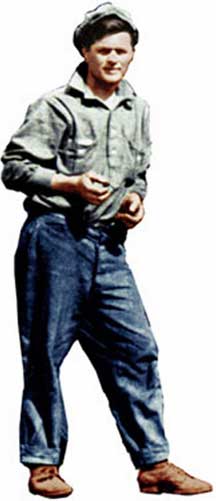 |
|
Rilda Martin came
to Washington State from Wisconsin with her parents in 1904 and
served as president of her 1911 graduating class in Des Moines.
After attending and graduating from Bellingham Normal School
(now Western Washington University), she taught school in Neah
Bay. In 1918, she married Otto Moses and soon after, moved back
to Des Moines where she became Des Moines' first kindergarten
teacher. She taught classes in the basement of the Des Moines
United Methodist Church until 1966, instructing over 1,200 children
in her years as teacher. Rilda was a very active citizen who
made her home, raised her family, worked, socialized and prayed
in Des Moines, until her death in 1988, at the age of 95. She
was one of our true pioneers.
|
|
Reverend Fritz Hjelm (pronounced
"yelm") served as pastor of the Covenant Church Camp
from about 1931 to 1939. The Covenant Beach Church Camp, was
located at what is now known as Des Moines Beach Park. Reverend
Hjelm was in charge of the Young People's evening fireside services
in front of the fireplace in the Auxiliary Hall in 1934 and was
one of the speakers at the new Covenant Bible Camp's first Annual
Conference in 1932 - giving both lectures and sermons. In 1937,
he was President of the North Pacific Missionary Conference,
and presided as the platform chairman at the annual conference.
Pastor Hjelm was also an editor for the Tabernacel Klockan, a
noteworthy and widely read church newspaper, initially published
in Swedish.
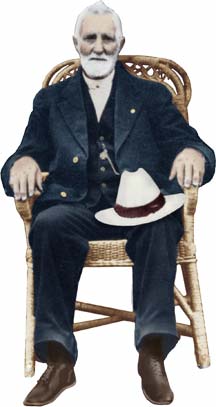 |
Civil
War veteran, Nathan E. Munger was an early resident of the Zenith
neighborhood in Des Moines. The Munger family grew flowers to
sell on the 5 acre property they owned. Captain Commons, another
civil war veteran, lived across the street from Nathan and it
was said that the two men continued to fight the war for as long
as they lived, by moving the boundary road marker continuously.
Each man insisted the other had his fence too far out in the
road. Nathan and his wife Clara were members of the Des Moines
Grange No. 471. |
|
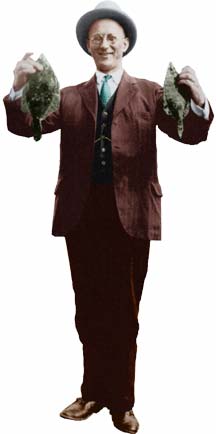 |
|
| Myrtle Jones Elsey
was an enterprising resident of early Des Moines who operated
the town's first beauty shop. Her original business was in her
father-in-laws' house, on 6th Avenue between South 222nd and
South 223rd streets. Myrtle and her husband, Everett Elsey later
built a new house with a shop in front at 11th Avenue South and
South 220th Street. As a young woman in 1909, Myrtle was on the
Des Moines Woman's Basketball Team with her friend, Rilda Martin
Moses. Mrytle Jones Elsey's husband, Everett was the grandson
of one of Des Moines' early settlers, David S. Elsey who homesteaded
and farmed 40 acres in Sunnydale. Everett's father, John C. Elsey
operated a sawmill in Des Moines, and platted and sold the remaining
parts of the townsite of Des Moines in 1896. |
|
|
Agnes Marshall served as Head
Librarian for Des Moines from 1947 until 1963. The library got
its start at Grist's General Store, where citizens would borrow
books discarded from Seattle's public library. It was located
originally at the Des Moines School until it burned in 1925.
Agnes ran the library in a
small room at the Field House that held 9, 594 books! Her home
still stands on Marine View Drive, in downtown Des Moines.
|
|
 |
|
Rollin Ashley Case, Jr. was
born in 1893 in Tacoma, Washington. He was one of four children
in the family of Rollin A. Case Sr., a former representative
of the territorial legislature from Asotin, and prominent local
real estate man. The family moved to Seattle in 1900, then two
years later to Des Moines. In 1914 he married Marion Wilcox of
Sunnydale, and after the death of his father, moved with his
family into the family home on 10th Ave.S. near what is now the
Des Moines Yacht Club.
Rollin worked in Seattle at
Sears, Olympic Garage, and Ernst Hardware for many years. For
a short while he was employed by the Des Moines Bus Company,
followed by a job at Seattle Brass Co. where he made brass items
such as light fixtures. He was an accomplished musician, playing
piano, organ, drums, saxaphone and xylophone. Rollin Jr. volunteered
his musical talents with numerous groups, playing at clubs, events
and private gatherings. He was also an organist who accompanied
silent movies at a theater in Sunnydale for several years.
As young men, Rollin Jr. and
his brother, Gahail were members of the Des Moines Baseball Team
in the early 1900's, competing with teams throughout the region.
Rollin Jr. later was their coach.
Rollin Case Jr. died in 1944
at age 50 from a heart attack. His widow Marion lived in the
family home until her own death in 1993 at 97.
|
|
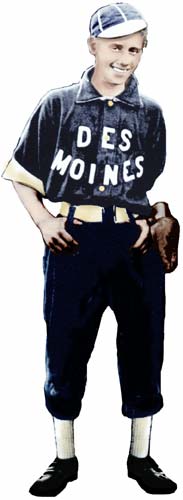 |
©1987-2010 Daniel Wend
/ Wend Images. All material on this site is protected under United
States and international copyright laws and is the sole property
of Daniel Wend. All other uses are prohibited unless otherwise
authorized.
|










